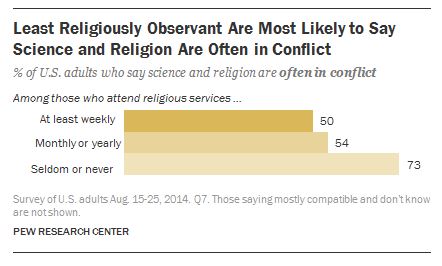Belief of a conflict between science and religion does break along lines of religious belief - but not how most people think. The most religious people do not see a conflict with science, it is instead people on the other side who think the most religious people must be against science - that science and religion are in opposition - that increase belief in a conflict between them.
If only 30 percent of Americans think their religious beliefs conflict with science, it is nothing extraordinary. Twenty-four percent think they need to remove gluten from food. And almost 100 percent of Americans have some conflict with science; if you ask Democrats about vaccines and GMOs, or Republicans about evolution and global warming, they skew quite clearly.
Instead of religious people thinking science and religion are in conflict, it is the 73 percent of people who never attend church who think they must be in conflict - because religious people must hate science. If that baffles you, the strange science beliefs of other countries (herbal medicine in Asia, banning everything in Europe) make more sense, because Americans have the highest adult science literacy in the world.

According to the Pew Research Center survey:
· 76% of respondents who have no religious affiliation think science and religion, in general, are often in conflict. But when it comes to personal beliefs, just 16% of the religiously unaffiliated say their religious beliefs conflict with science.
· 40% of white evangelical Protestants say their personal beliefs sometimes conflict with science, while a 57% majority say they do not.
· The share of all adults who perceive a conflict between science and their own religious beliefs has declined in recent years from 36% in 2009 to 30% in 2014. The change occurred only among those who are affiliated with a religion; among this group, the share who say science sometimes conflicts with their personal beliefs is 34%, down 7-percentage points from 41% in 2009.
· Among the three-in-ten adults who say their own religious beliefs conflict with science, the most commonly mentioned source of conflict was beliefs about the creation of the universe and evolution.





Comments